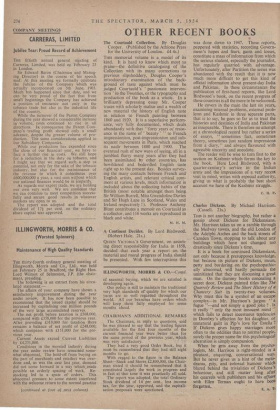Charles Dickens. By Michael Harrison. (Cassell. 21s.) Charles Dickens. By
Michael Harrison. (Cassell. 21s.) Tins is not another biography, but rather a gossip about Dickens for Dickensians. Mr. Harrison takes us on a ramble through the Medway towns, and the old London of the Adelphi Arches and the back streets of Camden Town, stopping to talk about any buildings which have not changed too drastically since Dickens's time.
It is a book for convinced Dickensians, not only because it presupposes knowledge, but because its picture of Dickens, mean, petty and bordering on the psychopathic- ally abnormal, will hardly persuade the uninitiated that they are discussing a great man. On the dummy books concealing a secret door, Dickens painted titles like The Quarrely Review and The Short History of a Chancery Suit in twenty-two volumes. Why must this be a symbol of an escape complex—in Mr. Harrison's jargon " a fugue "—and not simply a good joke ? Is it really " only the most innocent mind " which fails to detect incestuous tendencies in Dombey's affection for his daughter, or unnatural guilt in Pip's love for Estella ? If Dickens gives happy marriages more often to the oddities than to normal people, surely the proper name for this psychological aberration is simply compassion.
When he gets away from the psycho- logists, Mr. Harrison is right-minded in a pleasant, enquiring, conversational way. But he never gives us a hint of the melo- drama, pity, and colossal humour which blazed behind the trivialities of Dickens's behaviour, and still matter long after his quarrels with publishers and his affaire with Ellen Ternan ought to have been


































 Previous page
Previous page